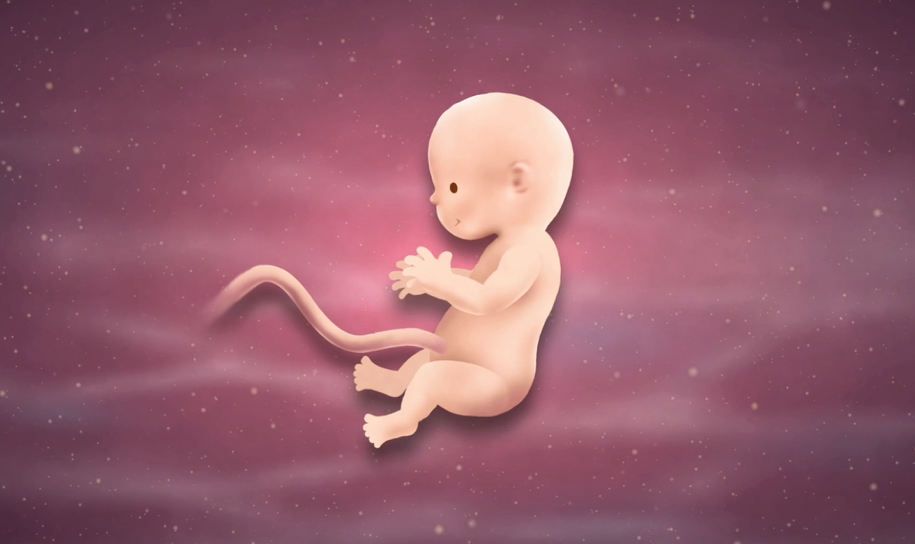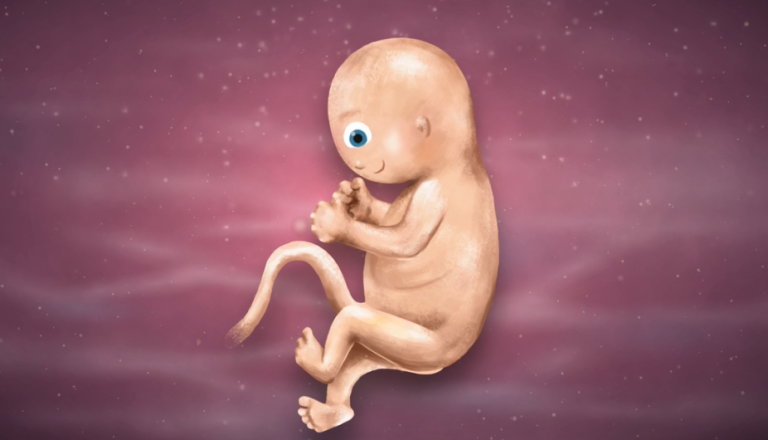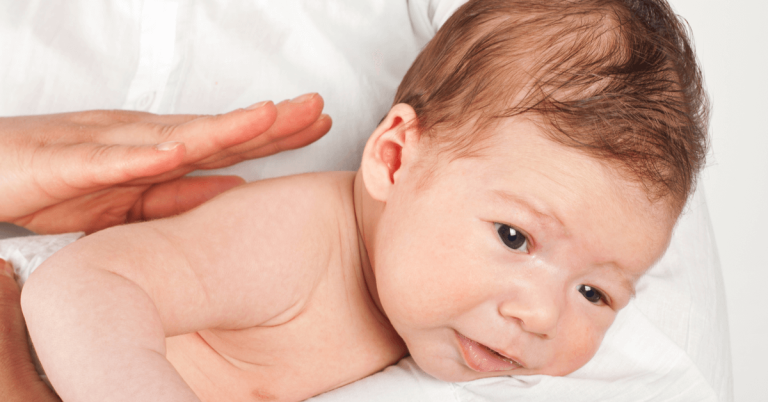Time is moving fast, and you have already left nine weeks of pregnancy behind. You have now arrived in the tenth week. This is a period with many changes as you approach the end of the first trimester. Let’s examine the changes in you and your baby.
Your Baby at Ten Weeks
In the tenth week, your baby completes its journey as an embryo and is now referred to as a foetus. This also indicates that your baby has successfully passed the most critical period. You can breathe a sigh of relief.
How Big is Your Baby at Ten Weeks?
Gone are the days when your baby looked like a bean on the ultrasound screen. He has taken human form, and his head has become more prominent. Very exciting! Your baby is now the size of a strawberry. His weight and height increase will become more apparent.
You can find the average foetal length and weight in the table below. These values are averages and may vary from baby to baby due to differences in the moment of fertilisation, which cannot exactly be determined. If fertilisation occurred later than expected, your baby’s values might be lower. Only your doctor can tell you whether there is cause for concern or not.
| Gestational Age | Weight | Length |
| 10th week | 4−5 g | 3−3.5 cm |
Development of the Organ Systems and Skills
Every week, your baby acquires new and different features. At ten weeks, he is transitioning from the embryonic to the foetal stage. The number of cells increases, the body grows, and the organs and related systems develop. So, what do these developments involve in the tenth week?
- The Nervous System
Your baby has noticeably changed. The most obvious change is his skull, which creates space for the rapid development of the brain. The foetus’s brain will not be completed until birth, and changes in the nervous system continuously occur. The eyelids, which begin to form in the ninth week, complete their development to a large extent this week.
- The Circulatory System
When the yolk sac disappears in the ninth week, its functions are taken over by the umbilical cord. Although the sac has not completely disappeared in the tenth week, the foetus’s blood circulation starts when the umbilical cord forms. The heart now has four chambers and works at 180 beats per minute, twice the speed of an adult’s heartbeat.
- The Digestive System
The intestines continue to extend and develop into the abdomen. They will soon be completed. In addition, the stomach, spleen, and liver are now in place, and the liver has begun to produce blood. The pancreas and gallbladder also continue to grow.
- The Respiratory System
Just like the brain, the respiratory system does not complete its development until birth. The duty of the amniotic fluid is not only to protect your baby. It also plays an important role in the development of the lungs. Your baby’s mouth is now developed, and he starts swallowing this liquid and “breathe” it into his lungs, expanding the alveoli (air sacs) and stimulating them to grow. The diaphragm, which started to form in the previous week, gradually completes its development.
- The Musculoskeletal System
As your baby’s bones and muscles develop, the webbing between your baby’s fingers and toes disappears. His muscles grow stronger, and he can now move his hands and feet more easily. In addition, his elbows grow, and he will start moving them. But his movements are still too small for you to feel them.
- The Urinary System
Your little one’s kidneys have started to produce urine. Your baby swallows amniotic fluid, which is then filtered by the kidneys and turned into urine. This excreted urine is harmless.
- The Reproductive System
One of the most interesting subjects is, of course, the gender of your baby. By the tenth week, your baby’s external genital organs become apparent. However, they are not yet developed enough to determine the gender on ultrasound. You will have to wait a little longer.
- The Endocrine and Immune System
Your baby’s thyroid gland has started to work and gradually progresses towards completion. The amniotic fluid continues to protect your baby from external influences.
Your Baby’s Movements at Ten Weeks
As your baby’s bones and muscles develop, there is an increase in mobility. However, since your baby is still very small, you won’t be able to feel this yet.
A Ten-Week-Old Foetus’s Sense Organs
As the brain controls the sense organs, their functioning depends on the maturity of the related part of the brain. The brain does not complete its development until birth and beyond, so the same applies to the sense organs. Let’s look at what happens in the tenth week of pregnancy.
- The Eyes and the Sense of Sight
The eyelids are approaching their completion. The iris, which forms the eye colour, gradually begins to form. Your baby cannot see yet, as his eyes and eye muscles are not fully developed. As of this week, there is a distinction between a state of sleep and wakefulness, even though your baby’s eyes are still closed. Your baby is preparing to open his eyes soon.
- The Ears and the Sense of Hearing
After your baby’s earlobes, the auricle starts to grow. As his ears develop, it is almost time to hear your voice.
- The Skin and the Sense of Touch
Although the skin layer covering your baby’s body is not completed, his sense of touch is the first to develop. Your baby now feels touch and pressure and moves in response. Touching, stroking, and massaging your belly will strengthen your bond.
- The Tongue and the Sense of Taste
The jawbone and teeth buds begin to form. The first place where the sense of touch develops is around the mouth and cheeks.
- The Nose and the Sense of Smell
The baby’s facial features are becoming clearer, and the nose is the most prominent. It is too early to talk about the sense of smell, as this will develop along with the sense of taste.
How Many Months is Your baby at Ten Weeks?
Pregnancy lasts nine months and ten days, or 40 weeks. Although most people express pregnancy duration in terms of months, your doctor will count your gestation in terms of weeks. So, how can you convert this?
1 week = 7 days; 1 month = 30 days
10 weeks = 10 × 7 = 70
70/30 = 2 months 10 days
Based on this calculation, your baby is now approximately two months and ten days old.
Your Body at Ten Weeks of Pregnancy
The changes in your body and mind multiply. Let’s examine what you should be prepared for at ten weeks of pregnancy.
- Weight gain
The most obvious pregnancy change is, of course, weight gain. However, since your baby is very small now, excess weight gain is undesirable. During the first trimester, it is recommended that you gain no more than 1−3 kg.
- The expansion of your uterus
Your uterus, which significantly grew the previous week, reaches almost the size of a grapefruit by the tenth week.
- Breast enlargement and tenderness
The breasts begin to prepare for the postpartum period in the first trimester. Progesterone stimulates the growth of the mammary glands, and oestrogen causes the milk ducts to enlarge. The veins expand, the breasts swell, and the nipples grow bigger. The breasts know their biggest increase during the first trimester. Your bra size may even move up two sizes. After this, they will not get much larger unless you gain much weight.
- Changes in your skin
Due to the increased hormones, your skin secretes more oil, which makes your skin look brighter. In addition, the increase in blood volume makes your face look clearer and livelier. You may often hear that pregnancy suits you well. 😊
- Pregnancy anxiety
The first moments after you found out you were pregnant were pretty exciting. However, as the days go by, you may start to worry and get anxious. You can call it pregnancy anxiety. You may be worried about birth or the postpartum period. All expectant mothers experience this in one way or another. In addition, you may feel tired, exhausted, and sluggish. Occasional headaches may accompany these symptoms. However, there is nothing to worry about. This is a normal part of pregnancy, and these days will be over soon.
- Frequent urination
Frequent urination will continue this week, and you may also experience some constipation. Vaginal discharge is also among the common ten-week pregnancy symptoms.
- Nausea
Morning sickness usually decreases at the end of the first trimester. But you will need to be a little more patient for it to disappear completely. You may also continue to experience heartburn, gas, and bloating.
Tips to Minimise Troublesome Pregnancy Symptoms
Since pregnancy is a period of many changes, some of the issues you experience may disturb you. These are problems that almost every expectant mother experiences. However, you have left the most challenging period – the first nine weeks of pregnancy – behind. In fact, at ten weeks, you enter the most enjoyable and comfortable period of pregnancy. Some even call this the “honeymoon period of pregnancy.” Below are some tips and tricks to minimise challenging pregnancy symptoms.
- The tenth week of pregnancy is a period when you can experience some mental health challenges, like emotional breakdowns and anxiety. Try not to suppress these emotions but express and release them. These ups and downs are normal. Almost every expectant mother goes through this.
- Even though the riskiest weeks have passed, you should keep to your doctor’s check-up schedule. This will prevent issues from going undetected for a long time and allow for early interventions, if necessary.
- Pregnancy comes with many responsibilities. Questions may be swirling through your mind, causing emotional shifts as well. Take some extra time for yourself. While your belly is not restricting you yet and your baby does not need attention, try to continue to have an active social life, take walks, and spend time on activities that energise you. This will support your physical and mental health.
- Almost all expectant moms experience frequent urination. Doctors, nutritionists, and experts recommend removing caffeine completely or reducing it significantly because it acts as a diuretic. If you consume caffeine, consume more water, so your body replenishes and does not become dehydrated.
- You may feel tired and sluggish. Take rest and lie down whenever you can. Remember that you will miss these days in the future. You can also increase your blood circulation by walking, stretching your legs, and lying on your left side. This will help you feel reinvigorated.
- During the tenth week of pregnancy, your blood circulation increases. This may cause your gums to swell and bleed. Always remember to brush your teeth. If you have not changed your toothpaste yet, it is recommended to switch to organic toothpaste now. If you experience excessive bleeding and swelling, contact your doctor and dentist.
How Much Weight Should You Gain?
Excessive weight gain in the first trimester is not desirable. Your baby will grow faster soon, so your weight gain will also accelerate. Therefore, pay attention to adequate and balanced nutrition. During the first trimester, your weight gain should be no more than one to three kilograms.
Nutritional Recommendations at Ten Weeks of Pregnancy
Your baby receives the nutrients you consume through the placenta, so you must be selective and careful about what you eat. Here are some nutritional suggestions for the tenth week of pregnancy:
- As your morning sickness decreases, your appetite may also increase, so be careful. Talk to your doctor to get an idea about proper pregnancy nutrition. Especially when you feel tired or in a hurry, healthy snacks will save you. Eating a handful of hazelnuts, walnuts, almonds, or a portion of fruit or dried fruits, is ideal.
- Iron is very important for both you and your baby. It has many functions, from developing your baby’s brain to blood circulation. Therefore, monitor your iron intake throughout pregnancy. If necessary, your doctor will support you in this regard. In addition, regularly consume foods that are rich in iron, such as red meat, fish, eggs, beans, lentils, and chickpeas.
Exercise Recommendations at Ten Months
It is crucial to continue moving and exercising during pregnancy, to keep fit and help control your weight gain. It will also be beneficial for delivery. Your growing belly will also affect your musculoskeletal system in the future. Exercising now may help prevent or reduce these issues. Talk to your doctor or a sports coach who is knowledgeable about pregnancy. Generally, the following activities are considered ideal at ten weeks of pregnancy:
- Light-paced walking.
- Exercises to stretch and strengthen the spine.
- Pregnancy Pilates
- Pregnancy Yoga
- Swimming
Ten-Weeks-Pregnancy Checklist
- If you haven’t had these, you should have a blood test and general health check as soon as possible. In the coming months, the tests you need will increase.
- You can reserve some time for yourself and go shopping. Your breasts have started to grow, so your bras may have become too small. You can opt for nursing bras or non-wired bras in flexible materials, so you will be able to use them for a while. Also, your clothes may feel tight as your waist expands and belly grows. Find some comfortable clothes with an elastic waistband in your closet and add buying maternity clothes to your to-do list.
Ten-Week Pregnancy Shopping Advice
Shopping for your baby is exciting, right? Though it may seem early, the number of baby items you need is large, so it is good to start planning, collecting and buying baby stuff already. You can start with baby blankets, newborn clothes, and muslins, as you will frequently use these after birth. 🙂







